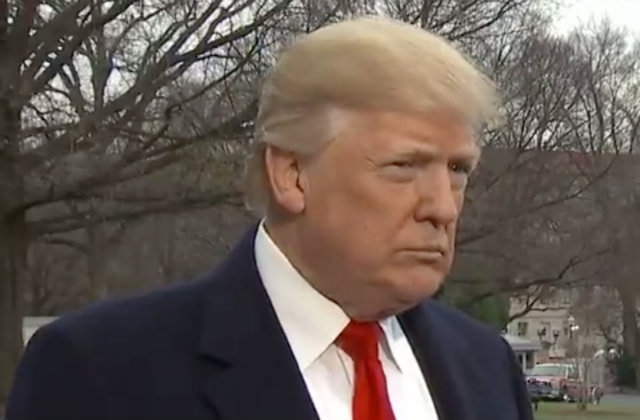
President Donald Trump has come under fire for his response to allegations against former aide Rob Porter, who was accused of physically abusing his ex-wives. Trump wished Porter well in his exit from the administration amid the claims, supporting him while he faces the allegations, calling for “due process.” Critics of the president have noted that this pretty much the opposite of how he responded to the accusations against the “Central Park Five,” a group of black men that were convicted — and then cleared of attacking and raping a woman in 1989.
Two of those men, Yusef Salaam and Raymond Santana, spoke to CNN’s Anderson Cooper Monday night to discuss this. Salaam said that by refusing to condemn a white man who was accused of attacking women, while being so quick to condemn black men, Trump showed signs of “affluenza,” Santana said this is just who Trump is.
Santana said Trump’s differing response shows a double standard that’s based on race.
“[H]ere we are, Black and Latino boys who were 14 and 15 years old, and he didn’t mind giving us the death penalty…at the end of the day, this is his character,” Santana said.
Trump continued to insist that the Central Park Five were guilty as recently as October 2016 in a CNN interview. “They admitted they were guilty,” he said then. “The police doing the original investigation say they were guilty. The fact that that case was settled with so much evidence against them is outrageous. And the woman, so badly injured, will never be the same.” Trump’s remarks drew criticism for publicly condemning people who were exonerated by the court, but he’s not the only one who wasn’t convinced by the evidence that cleared them.
On the night of April 19, 1989, a 28-year-old white woman was assaulted and raped in New York City’s Central Park. A number of suspects were accused of a variety of offenses against numerous victims in the park that night. There were no witnesses to the attack, and the woman had no memory of what happened. She was found in the park unconscious, bleeding, gagged, and naked, in the middle of the night. Five teenagers were arrested and convicted based largely on their confessions, where they implicated each other. They were also convicted of attacking other people in the park that night.
Two weeks after the rape, Trump took out full-page ads in four New York area newspapers saying, “Bring Back The Death Penalty. Bring Back Our Police!” The case was widely talked about, and Salaam, told CNN that Trump had a lot to do with it. “He was literally like the fire starter. He lit the match,” Salaam said in 2016. Salaam served his full prison sentence of almost seven years before he was later cleared.
In 2002, Matias Reyes, a convicted serial rapist and killer, confessed to the attack, saying he acted alone. DNA evidence — still new at the time of the initial trial — confirmed Reyes’ involvement. A court ruled that the confessions of the Central Park Five had been coerced, and that they had nothing to do with the incident. All five were exonerated. In 2003, they sued the city, and eventually received a $41 million settlement in 2014.
Still, Trump continued to insist that the Central Park Five were not innocent on the night in question.
evidence of Trump’s casual racism has been around for years pic.twitter.com/xSDd0Qx7ir
— Adam H. Johnson (@adamjohnsonNYC) October 7, 2016
However, Trump isn’t the only one who wasn’t entirely convinced that Reyes acted alone. A panel of three attorneys commissioned by the NYPD in 2003 believed that the Central Park Five were most likely involved in the attack, just not the rape. “Our examination of the facts leads us to suggest that there is an alternative theory of the attack upon the jogger, that both the defendants and Reyes assaulted her, perhaps successively,” the lawyers wrote in their report, according to a New York Times article. They described their theory, saying that the Central Park Five attacked the woman first, and that “Mr. Reyes, drawn by her screams, either joined in the attack as it was ending or waited until the defendants had moved on to their next victims before descending upon her himself, raping her and inflicting upon her the brutal injuries that almost caused her death.”
The panel felt that there was no foul play when police took the confessions of the five men, who were all teens at the time. Reyes’ version of events, that he acted alone, was only supported by “his uncorroborated word,” they said. The panel also mentioned that after they had already been convicted, some of the Five reiterated their confessions during parole hearings.
Robert Morgenthau, who was Manhattan District Attorney at the time, said that a reconstruction of the night’s events showed that the Central Park Five were in a different area of the park at the time of the rape, attacking other victims. The convictions for the other attacks were also reversed, as Judge Charles Tejada said that information regarding the rape likely clouded the jury’s perception when they ruled. Meanwhile, Matias was never convicted for the crime because the statute of limitations had run out by the time he confessed. He is, however, currently serving a lengthy sentence for other offenses.
The NYPD panel’s theory of what happened that night clearly has not convinced everyone, as the public opinion has sided with the court’s decision. Trump, however, has stuck to his original story.
A version of this article was first published on October 7, 2016.
[Image via ABC screengrab]